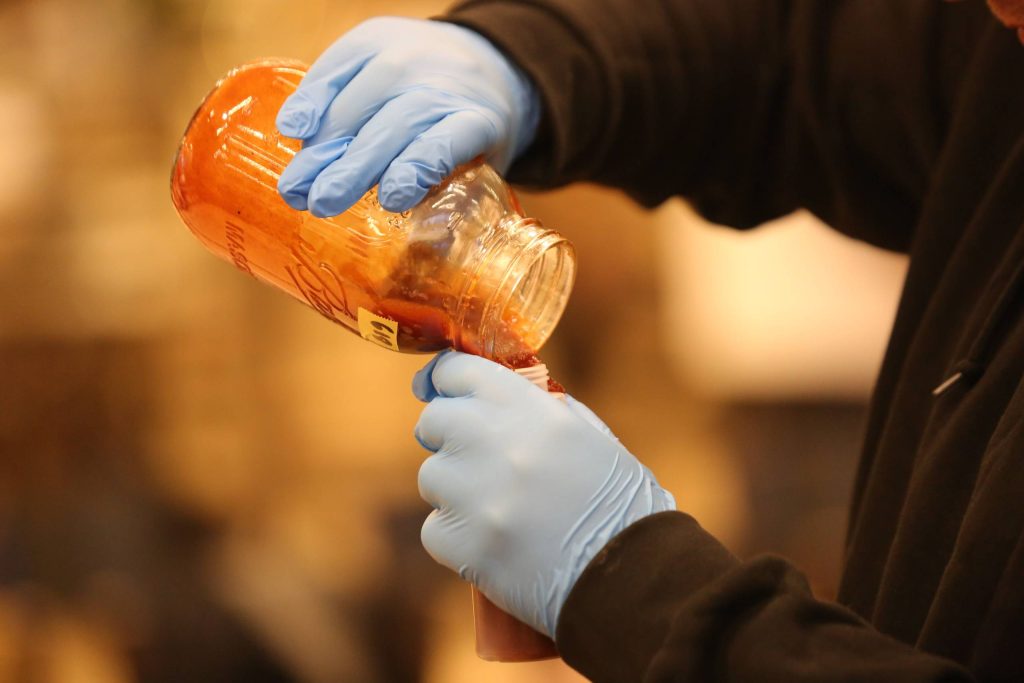
A capstone course within the food science and nutrition degree program, the Food Product Development (F_S 4970) class allows students to integrate the various disciplines of food science to create new food products.
Andrew Clarke, an associate professor, has taught the writing-intensive course for more than two decades – helping to lead students on a journey that begins with them developing a concept and ends with them creating a new food product.
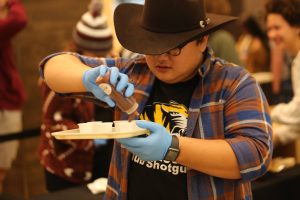
This semester, students were tasked with creating a Kansas City-style barbeque sauce, which is typically sweeter in nature. That food product focus wasn’t random – Sonja Derboven, licensing director at the University of Missouri, asked Clarke before the semester began if there would be an interest in having the students take on such a project, with the goal of potentially taking one sauce to market in the future.
“I’ve attended multiple collegiate licensing conferences recently and consumable products are incredibly popular at the moment,” Derboven said. “Items such as cookies, hot chocolate and salsa all provide an opportunity to license a product and take it to market. With the recent success that our textile and apparel management students had in creating MU apparel, I thought there would be a great opportunity to find a food product tied to Mizzou.”
Clarke’s course provided the perfect avenue for a new product, especially one where students would be involved from the beginning.
“Having students involved brings another layer to a project of this nature,” Derboven said. “It’s not just us putting a logo on a product and saying it’s great because it’s Mizzou. Students leading the charge and using a learning opportunity of this nature to create something really showcases what our university is all about. This is more than barbeque sauce – it’s part of the student experience.”
Throughout Clarke’s time teaching the course, he’s had students tackle a variety of food products. His goal is to give the students the freedom to explore their ideas and interests, even if the end product is more focused, such as a barbeque sauce.
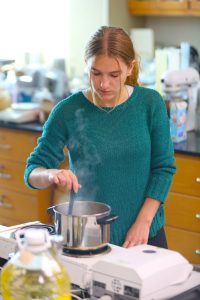
“Sometimes I’ll be a bit more general, such as make a meat product, which leaves the door wide open for development opportunities,” Clarke said. “Every so often, I’ll create a more specific theme for the students to follow. Even with a concept that is more defined, like barbeque sauce, there are still multiple opportunities for the students to do individual work; it doesn’t diminish all of the creative activity.”
The course is divided into three primary sections. Students spent the first part of the semester studying product development and began the idea generation phase of their product. Each of the 11 students in the class were tasked with studying the barbeque sauce market, including what products are already available, and what the target market would look like for a Mizzou barbeque sauce.
“We’ve studied a variety of approaches when it comes to product interest,” said Joe Baratta, a graduate student in food and hospitality systems, and teaching assistant for the course. “The best product from a single person’s point of view is a completely subjective answer, so it’s been important for us to incorporate a variety of sensory studies. For example, is a product preferred because it’s a standout or because it’s the best out of several bad options? Those discussions are a big aspect of food product development.
“It’s exciting because our students are getting a complete look at development, and it really provides authenticity to our project.”
Each student created their own barbeque sauce concept and presented their ideas in front of the class. After those presentations, the class voted on the top four sauce ideas. The four “winners” took leadership roles and teams were quickly formed, with three teams of three students and one team of two students.
“Each of us had our own thoughts, so the first thing we had to work through was combining our ideas and figuring out what was realistic,” said Michael Tran, a junior food science and nutrition major. “We had to find a good balance. With my team, for example, I was primarily focused on flavor. I didn’t even have a name when I presented my concept. My teammates definitely had more experience on the marketing side, so they ran with that work.”
After the teams were formed they each took to the laboratory to begin barbeque sauce development, the second section of the class. The teams spent several lab sessions mixing multiple ingredients looking for the correct match of flavors.
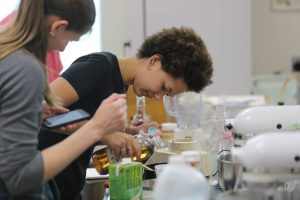
“This part of the class is obviously very exciting,” Baratta said. “It’s high energy and offers the students an opportunity to play with ingredients. While there is a big science component to it, the artistry of being a chef also comes into play. Students were working on finding which flavors mesh best.”
The students each had their own unique spin on barbeque sauce flavors. Tran, for example, worked specifically with tamarind and different umami sources.
“For me, I wanted to use ingredients that I grew up with,” Tran said. “I have Asian parents who came from Vietnam, and I was focused on bringing together flavors tied to my heritage as well as Missouri. I enjoyed being able to create something that honored both my ancestral homeland and where I live now.”
Memphis Bancroft, Lucy Bodde and Jordan Efken were selected to lead the other three teams. Bancroft, a senior food science and nutrition student, used garlic as her primary base component.
“I wanted my sauce to have a strong flavor,” Bancroft said. “We eventually added ginger and lemon to balance everything out a little bit. My focus early on was to create something that would resonate with a huge group of people, but I soon realized that I wanted something for individuals who are willing to step out and give something unique a try.”
Bodde, a senior food science and nutrition major, utilized chili peppers for her sauce; Efken used honey as a sweetener.
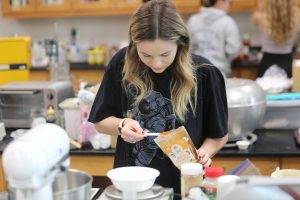
“I love spicy foods, so my goal was to create something with a bit of that,” Bodde said. “It was really interesting to see what flavors came out while we were mixing ingredients together. I had never made barbeque sauce from scratch before so the entire course has been a really interesting experience.”
“I enjoy when a barbeque sauce has an aftertaste that’s a bit different than the rest of the sauce. I like when that first taste is a bit sweeter and it ends a bit spicier,” added Efken, a senior business administration major who is also minoring in food science and nutrition. “I’ve really enjoyed my food science courses, and this class has definitely been a standout. It’s been such a great hands-on learning experience. I’ve had so much fun.”
The final part of the semester was spent perfecting each of the sauces, as well as preparing final presentations to showcase everything that the students learned throughout the semester. Students were tasked with providing their recipe, ingredient list, shelf life expectations, target audience and food safety guidelines, among other information.
“It was interesting to learn the ins and outs of food product development,” Efken said. “There is so much to it that I never would have thought about. For example, I learned a lot about preparing a food defense plan, which is something I had never heard of before. Plus, it was fun to dive in deeper into packing and bottling styles to go along with the sauce we had developed.”
Each of the four sauces underwent a handful of taste tests, too. The students critiqued each other’s products and Mizzou hosted a larger test taste where individuals from across campus were invited to participate. MU even invited five “celebrity” judges to give their opinions on the top sauce.
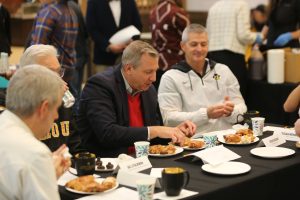
“It’s been really cool to have an opportunity to work with Mizzou on all of this,” Tran said. “I think food science is very much tied to Mizzou’s history, especially when you look at something like Buck’s Ice Cream. We fly under the radar a bit, so to have a chance of this nature where we get to showcase how great this program is has been super exciting.”
Clarke said that data from the taste tests is still being compiled, as is normal in food production. Bancroft’s barbeque sauce, which was created in tandem with Annie Benjamin, a senior food science and nutrition major, received the highest rating from the larger campus-wide test. Efken’s creation received the most votes during the celebrity taste test. Clarke said that all four sauces were well received, which means that further testing needs to be conducted.
Once that information is available, discussions will continue to see if the barbeque sauce can eventually be sold around mid-Missouri. Derboven said they have reached out to potential bottlers and the students are aware that there is a chance that their team could continue to refine their sauce next semester.
“The food science and nutrition degree program has really opened so many opportunities for me,” Bancroft said. “This experience has been incredibly unique, and it’s something that I’ll definitely remember after I leave Mizzou. I’m glad that we’ve been able to put the spotlight on this degree through this work.”